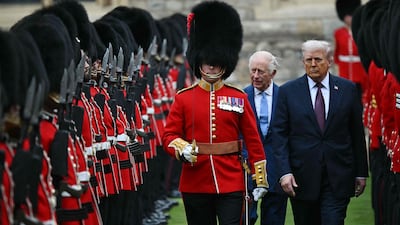US President Donald Trump was greeted with full British ceremonial pomp at Windsor Castle on Wednesday during his historic second state visit to the UK.
With the US set to celebrate the 250th anniversary of its independence next year, Mr Trump was shown a letter written by King George III in 1774 acknowledging that the governments of New England were in rebellion.
Royal librarian Stella Panayotova said the material in the Royal Archives related to the war of independence had been the highlight of the tour.
“The President was particularly interested in the material in the papers that related to independence,” she said.
Mr Trump and first lady Melania Trump were welcomed by Prince William and Princess Catherine in the walled garden at Windsor Castle. The Trumps then met King Charles III and Queen Camilla before inspecting a guard of honour.
After lunch and the archives tour, the couple paid their respects at the grave of Queen Elizabeth II, who hosted Mr Trump during his first state visit in 2019.

There were a handful of protesters outside Windsor Castle and they were far outnumbered by the international press stationed beyond the bastion’s thick 12th century walls.
Joseph Afrane, who was dressed in a British-US flag combination suit, was firmly behind Mr Trump's visit.
“It's good for both countries,” the self-proclaimed British patriot told The National. “It’s going to help Britain as I think the prime minister is going to persuade him to bring down the steel tariffs.
“Mr Trump is a good president, he says it straight, he talks about doing something and then he does it.”
But there was also those who argued that Mr Trump did not deserve a second state visit as he was, according to Nick Dearden, “driving his own country into authoritarianism”.
The leader of the Stop Trump Coalition believed that Keir Starmer’s benevolence was a “disastrous policy”.
“They're bowing and scraping to appease Trump in the hope of getting a better trade deal, but all the evidence to date suggests Britain hasn’t got a better deal,” he said.
“We haven't changed his mind on anything and given that Trump is here today with a bunch of big tech barons we risk handing over more of our sovereignty and rights to American corporate interests.”
He also voiced doubts that Mr Trump could be influenced on Gaza and Ukraine, as he “vacillates from one position to another”.
The decision to use Victoria House in the Royal Kitchen Gardens at Frogmore, a royal property near Windsor since the late 1700s, as the backdrop to the start of the charm offensive offers a personal, family-centred greeting especially for Mr Trump.
As the President shook hands with King Charles, a 41-round gun salute was fired from six First World War era guns simultaneously by The King’s Troop Royal Horse Artillery on the East Lawn of Windsor Castle, while the Honourable Artillery Company staged a salute more than 30km away at the Tower of London.
The scale and spectacle of the military ceremonial on show for Mr Trump is the largest military ceremonial welcome for a state visit to the UK in living memory.
In total, about 120 horses and 1,300 members of the British military will be involved in the ceremonial welcome at Windsor, with 160 personnel from the Royal Marines and Royal Navy, 1,000 from the British Army and 140 from the Royal Air Force.
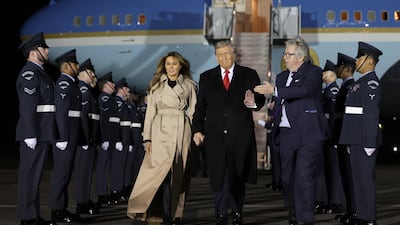
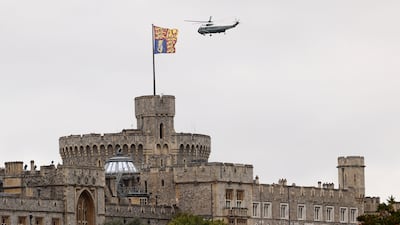

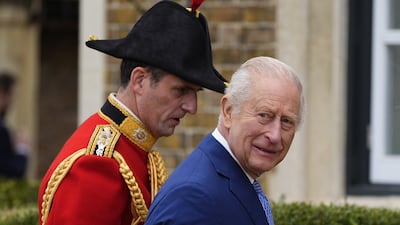


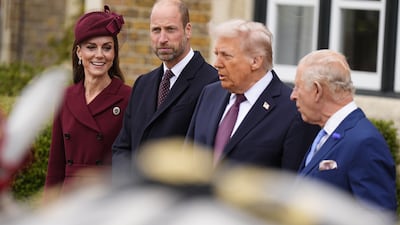
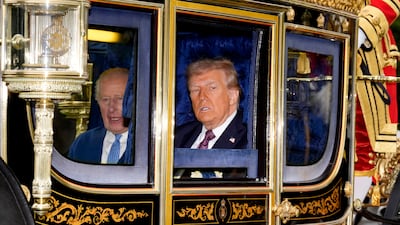

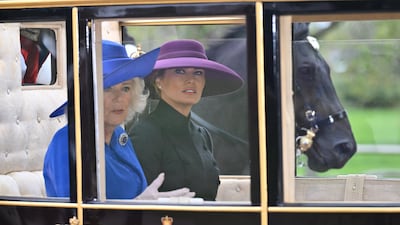

The number of military taking part in the ceremonial welcome is well in excess of the 850 who took part in French President Emmanuel Macron’s state visit in July.
The visit has a diplomatic purpose, tying the Trump administration to the relationship with the UK. After the Second World War, the term special relationship was popularised by prime minister Winston Churchill and London as strived to make that tagline stick.
Mr Starmer was the first foreign leader to seal a trade deal with the Trump White House and he walks a tight rope in keeping America on-board while pushing his policies.
“Keir Starmer has done well in handling this relationship. He’s been criticised for it … but it’s been the right approach, engaging to gain leverage,” said Simon Fraser, the chairman of foreign policy think tank, Chatham House. “But it’s important for the British government that they aren’t seen to be appearing to agree with President Trump on everything. On issues like freedom of speech, what’s happening in Gaza, and our views on Ukraine, the Prime Minister has to make clear our position is differentiated from the American one but do it constructively.”
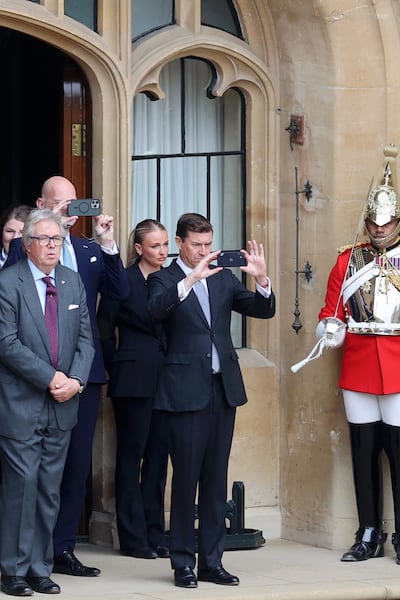
The build-up to the trip was rocked last week by the departure of the UK's ambassador in Washington. James Roscoe, the UK’s charge d’affaires in Washington, was seen at Windsor taking a picture of the spectacle during Mr Trump’s visit.
Mr Roscoe is the most senior diplomat at the embassy in Washington after Peter Mandelson’s sacking as ambassador in connection with the Jeffrey Epstein scandal. Mr Roscoe has held a string of senior roles in government and the royal household.
In the evening, Mr Trump attended a state banquet.
"Our countries are working together in support of crucial diplomatic efforts, not least of which, Mr President, is your own personal commitment to finding solutions to some of the world's most intractable conflicts in order to secure peace in striving for a better world," King Charles said.
Mr Trump praised the "bond of kinship" between the US and the UK, calling it "irreplaceable and unbreakable".

